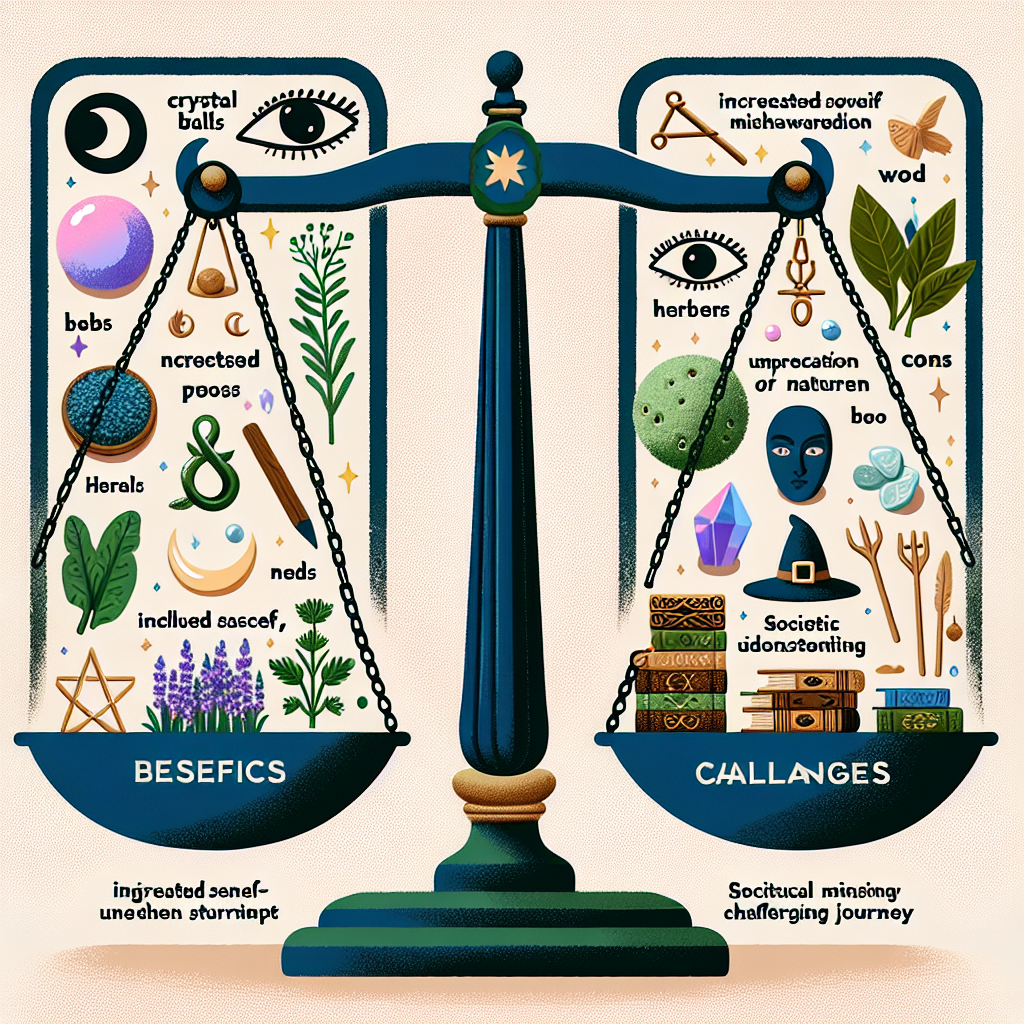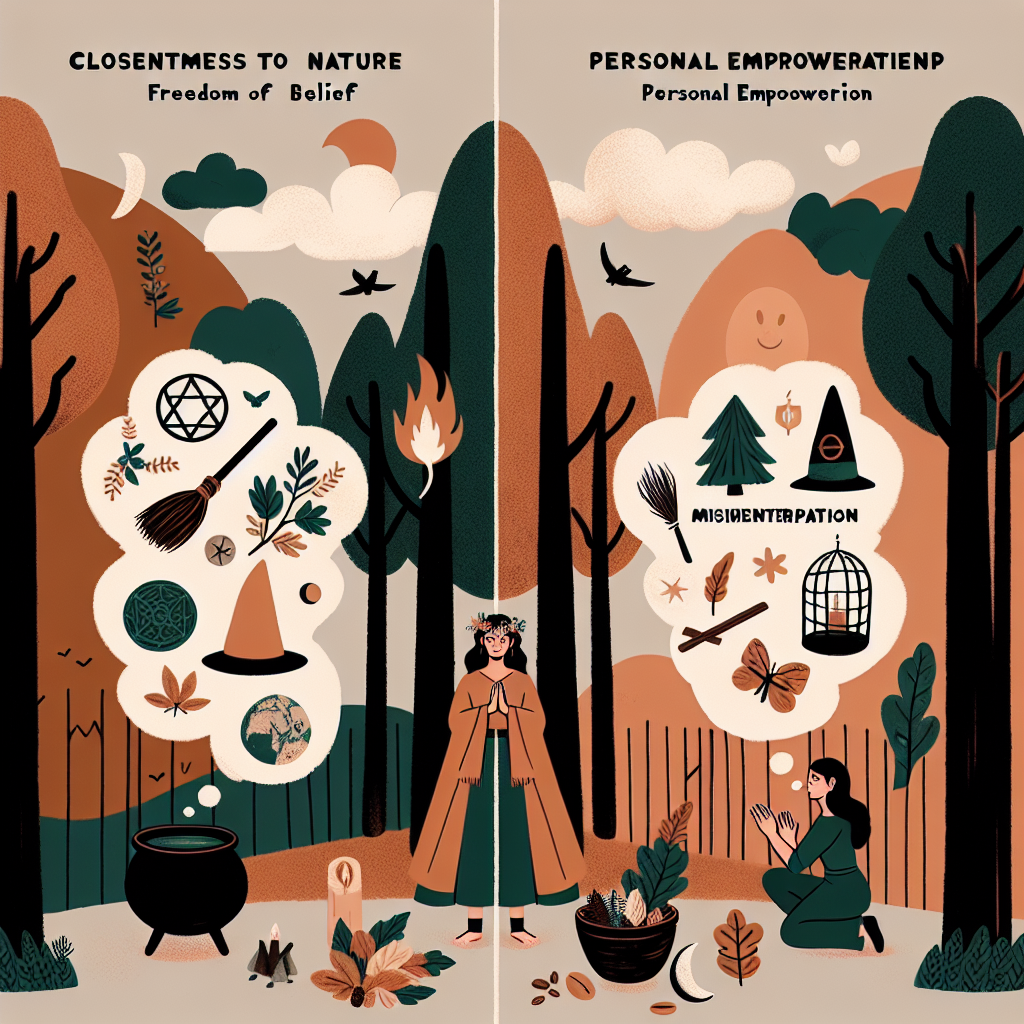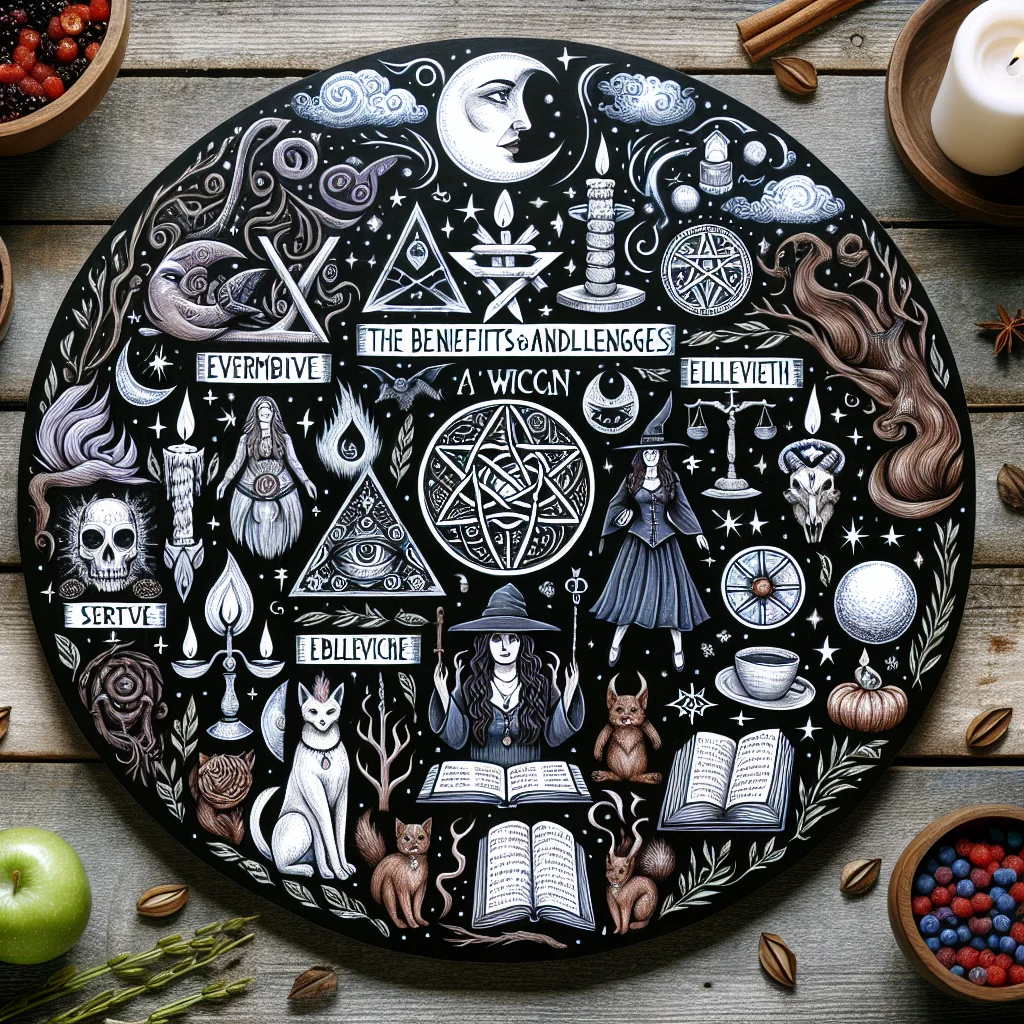As an Amazon Associate I earn from qualifying purchases.

Wicca is a modern Pagan religion that was popularized in the 1950s by Gerald Gardner, a retired British civil servant. He claimed that the religion was a survival of matriarchal religions of the pre-Christian Europe, and he published several books detailing his system of beliefs. Today, Wicca is known for its focus on the worship of a Goddess and a God, its practice of witchcraft, and its reverence for nature.
One of the significant benefits of being a Wiccan is the strong sense of community. Wiccans often gather for ceremonies known as sabbats and esbats, which correspond to seasonal change and lunar phases, respectively. These gatherings provide a supportive network that can be particularly empowering. Additionally, many practitioners find deep personal fulfillment in the spiritual connection with nature and the divine, which is an integral aspect of Wiccan worship.
Another important facet of Wicca is its emphasis on personal freedom and responsibility. This aspect encourages practitioners to follow their own spiritual path and ethical code, known as the Wiccan Rede, which states, “An it harm none, do what ye will.” This principle allows practitioners to craft a personal practice that fits their unique beliefs and lifestyle, leading to a highly personalized form of spirituality.
Despite these benefits, Wiccans face challenges, including misconceptions and discrimination. The practice of witchcraft and the worship of pre-Christian deities sometimes lead to misunderstandings and prejudice from those outside the faith. According to a survey by the Pagan Federation, a sizable minority of pagans, including Wiccans, report experiencing discrimination or harassment due to their beliefs.
Wiccans also grapple with the difficulty of maintaining secrecy about their beliefs in environments that may be less accepting. The decision to be “out of the broom closet,” as it is colloquially known, can be fraught with concerns about negative reactions from family, friends, and employers. Despite the growing acceptance of alternative religions in many places, the fear of social ostracism persists.
Furthermore, Wiccans who practice openly may need to navigate the challenge of educating others about their faith to dispel myths and stereotypes. This often requires a delicate balance of being an advocate for one’s beliefs while respecting the boundaries of those who may hold different views.
Advancing the Wiccan faith in the broader context of global religions presents both opportunities and difficulties. Wiccans often contribute to interfaith dialogue and environmental activism due to their religious values, demonstrating that their path adds a unique and valuable perspective to the world’s tapestry of spiritual traditions. Notwithstanding the obstacles they may face, Wiccans play a key role in advocating for religious pluralism and ecological preservation.
“`html
What Are the Pros and Cons of Practicing Wicca?
“`
Wicca, a modern pagan religion that celebrates nature, involves both rewarding experiences and obstacles. Its advantages include a deepened connection with the natural world, a strong sense of community, personal empowerment, and the freedom to tailor one’s spiritual path. Practitioners often find solace in the cyclical understanding of life, death, and rebirth, which can provide comfort and perspective on life’s challenges. However, followers may face misunderstandings due to common misconceptions about witchcraft, potential isolation from non-Wiccan peers, and the need for discretion in certain social or professional environments. Despite these challenges, many find the spiritual and personal growth gained through Wicca to be a profound and life-affirming journey. Discover more about the nuanced path of Wiccan practice, including how to navigate its complexities and embrace its transformative potential, in the following discussion.
Wicca, a modern Pagan religion that draws upon a diverse set of ancient pagan beliefs and ritual practices, has gained increasing popularity over the past few decades. Those who identify as Wiccans often experience a unique set of benefits and challenges associated with their spiritual path.
### The Benefits of Being a Wiccan
#### Spiritual Freedom and Personal Empowerment
Many Wiccans find that one of the greatest benefits of their faith is the spiritual freedom it offers. Unlike more dogmatic religions, Wicca encourages personal exploration and the development of a belief system that aligns with one’s own experiences and understanding of the divine. This empowerment allows individuals to craft their unique spiritual path.
#### Strong Sense of Community
The Wiccan community, though diverse, is generally inclusive and supportive. Through covens and solitary practice, Wiccans have the opportunity to connect with others who share similar values and beliefs. This sense of community can offer a supportive network, providing spiritual and emotional support.
#### Deep Connection with Nature
Wicca has a profound reverence for nature, which leads its practitioners to experience a deep and meaningful connection with the natural world. Celebrating the changing of the seasons through the Wheel of the Year promotes an awareness of the Earth’s cycles and underscores the importance of ecological balance and respect for all living beings.
#### Personal and Spiritual Growth
The practice of Wiccan beliefs, including meditation, ritual work, and spellcasting, often leads to significant personal and spiritual growth. With the focus on the Law of Threefold Return, which posits that whatever energy one puts into the world will return threefold, Wiccans are encouraged to live ethically and be conscious of their actions.
### The Challenges of Being a Wiccan
#### Misunderstanding and Misrepresentation
One of the more difficult aspects of being Wiccan is dealing with misconceptions held by the general public. Wiccans often face stigma due to persistent myths and misinformation about their beliefs, such as the association with evil or Satanism, which is actually not a part of Wiccan practice.
#### Legal and Workplace Discrimination
Wiccans can face challenges in environments where religious freedoms are not fully protected or understood. In some cases, openly practicing Wiccans have experienced discrimination in the workplace or when trying to hold public rituals. Ensuring that one’s religious rights are respected is sometimes a complex and ongoing struggle.
#### Interfaith Relations
As a relatively new spiritual movement, Wicca can sometimes find it difficult to establish interfaith dialogues with longer-established religions. This can lead to isolation or lack of recognition in broader religious communities. However, as awareness grows, there has been increasing collaboration and understanding between Wiccans and other faiths.
#### Finding Reliable Information and Resources
Given the eclectic nature of Wicca, there is a wide range of practices and teachings available, and not all sources are created equal. For newcomers, discerning reputable and accurate information on Wicca can be challenging. This can lead to confusion or the unintentional spreading of misinformation.
In spite of the challenges, many Wiccans find the spiritual path rewarding and fulfilling. As of my knowledge cutoff in 2023, Wicca continues to grow, with studies indicating that an estimated 0.4% of the population in the United States identifies as Wiccan or Pagan. This figure reflects an increasingly diverse religious landscape and highlights the ongoing significance of Wicca as a spiritual practice for many individuals.
- What exactly is Wicca and what does being a Wiccan entail?
Wicca is a modern, nature-based pagan religion that honors the cycles of nature and embraces a duotheistic belief system centered on a Goddess and a God. Being a Wiccan involves practicing rituals and ceremonies in line with Wiccan beliefs, observing sabbats and esbats, working with magic and divination, and following the Wiccan Rede, which advises to “harm none.
- Can anyone become a Wiccan or are there specific requirements?
Anyone can become a Wiccan as long as they feel a calling to the religion and are willing to respect its practices and beliefs. There are no specific requirements, such as background or heritage, needed to embrace the Wiccan path.
- What are the primary benefits of practicing Wicca?
The primary benefits of practicing Wicca include a deep connection with nature, personal empowerment through ritual and magic, a supportive community of like-minded individuals, and a flexible belief system that encourages personal growth and self-discovery.
- Are there any societal challenges that Wiccans face?
Wiccans can face challenges such as misconceptions, stereotypes, and discrimination due to lack of understanding by others. Since Wicca is a minority religion, some may feel isolated or encounter difficulties in openly practicing their faith.
- How do Wiccans deal with negative stereotypes?
Wiccans deal with negative stereotypes by educating others about their beliefs, practicing their faith with integrity, and engaging in interfaith dialogue to foster understanding. Some may also become involved in advocacy work for religious tolerance and freedom.
- Is magic an essential aspect of Wicca, and if so, why?
While not all Wiccans may practice magic, it is considered an essential aspect for many as it enables personal transformation and the manifestation of intentions. Magic in Wicca is viewed as a natural, harmonious force used for positive change, healing, and growth.
- How do Wiccans observe holidays and sabbats?
Wiccans observe holidays and sabbats in accordance with the Wheel of the Year, which includes eight festivals spaced evenly throughout the year, celebrating the changing seasons and cycles. Celebrations can involve rituals, feasting, and community gatherings, and vary from solitary observances to large public events.
- Can one be Wiccan without being part of a coven?
Yes, one can be Wiccan without being part of a coven. Many Wiccans are solitary practitioners who follow their individual paths, creating personal rituals and connecting with the divine on their own terms.
- Does Wicca have a central text or scripture?
Wicca does not have a central authoritative text or scripture. While there are many books and resources that Wiccans may find valuable for their practices, such as Gerald Gardner’s writings or the Book of Shadows, Wiccans often rely on personal experience, tradition, and intuition to guide their spiritual path.
- How does one deal with conflict between Wiccan beliefs and those of other religions or secular society?
To handle conflicts between Wiccan beliefs and those of other religions or secular society, Wiccans often advocate for peaceful coexistence and respect for all paths. Dialogue, education, and setting personal boundaries are tools Wiccans may use to navigate such conflicts while preserving their beliefs and practices.

Conclusion
Embracing Wicca offers numerous benefits, such as a deeply personal and flexible spiritual path that encourages connection with nature, the divine in various forms, and a tight-knit community that fosters a sense of belonging and support. Wiccans enjoy the freedom to craft their own rituals and beliefs systems, which promotes personal growth, empowerment, and a profound respect for the earth. The practice of magick, central to Wicca, is a source of inspiration and self-transformation, allowing practitioners to influence their own lives and improve their circumstances. The celebratory cycles of Sabbats and Esbats align Wiccans with the rhythms of nature, bringing balance and harmony into their lives.
Despite these advantages, Wiccans face significant challenges including misconceptions, discrimination, and lack of societal acceptance due to pervasive stereotypes and misinformation about their practices. Many Wiccans must navigate the difficulties of practicing their faith in a predominantly monotheistic society that often misunderstands or stigmatizes alternative religions. Wiccans who are not open about their beliefs can experience isolation and a lack of community, while others may struggle with the scarcity of public Wiccan spaces or official recognition. Balancing the secrecy often required to avoid discrimination against the desire for open practice and community adds complexity to the life of a modern Wiccan. Still, through fostering resilience and self-awareness, Wiccans can surmount these challenges, creating meaningful lives enriched by their spiritual path.
Amazon and the Amazon logo are trademarks of Amazon.com, Inc, or its affiliates.


